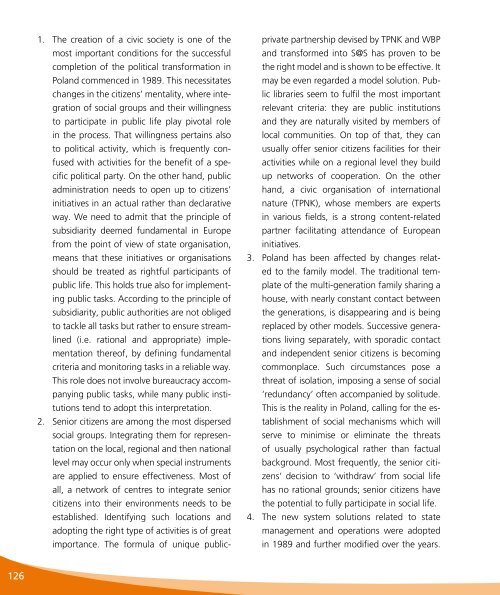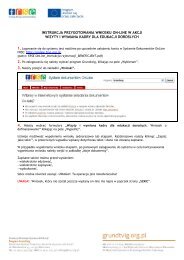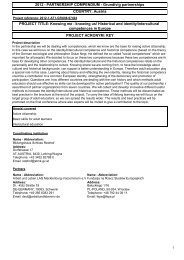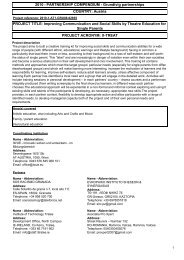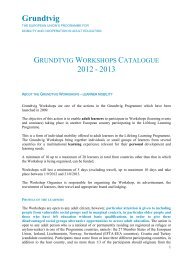Pobierz plik - Grundtvig
Pobierz plik - Grundtvig
Pobierz plik - Grundtvig
You also want an ePaper? Increase the reach of your titles
YUMPU automatically turns print PDFs into web optimized ePapers that Google loves.
1. The creation of a civic society is one of the<br />
most important conditions for the successful<br />
completion of the political transformation in<br />
Poland commenced in 1989. This necessitates<br />
changes in the citizens’ mentality, where integration<br />
of social groups and their willingness<br />
to participate in public life play pivotal role<br />
in the process. That willingness pertains also<br />
to political activity, which is frequently confused<br />
with activities for the benefit of a specific<br />
political party. On the other hand, public<br />
administration needs to open up to citizens’<br />
initiatives in an actual rather than declarative<br />
way. We need to admit that the principle of<br />
subsidiarity deemed fundamental in Europe<br />
from the point of view of state organisation,<br />
means that these initiatives or organisations<br />
should be treated as rightful participants of<br />
public life. This holds true also for implementing<br />
public tasks. According to the principle of<br />
subsidiarity, public authorities are not obliged<br />
to tackle all tasks but rather to ensure streamlined<br />
(i.e. rational and appropriate) implementation<br />
thereof, by defining fundamental<br />
criteria and monitoring tasks in a reliable way.<br />
This role does not involve bureaucracy accompanying<br />
public tasks, while many public institutions<br />
tend to adopt this interpretation.<br />
2. Senior citizens are among the most dispersed<br />
social groups. Integrating them for representation<br />
on the local, regional and then national<br />
level may occur only when special instruments<br />
are applied to ensure effectiveness. Most of<br />
all, a network of centres to integrate senior<br />
citizens into their environments needs to be<br />
established. Identifying such locations and<br />
adopting the right type of activities is of great<br />
importance. The formula of unique publicprivate<br />
partnership devised by TPNK and WBP<br />
and transformed into S@S has proven to be<br />
the right model and is shown to be effective. It<br />
may be even regarded a model solution. Public<br />
libraries seem to fulfil the most important<br />
relevant criteria: they are public institutions<br />
and they are naturally visited by members of<br />
local communities. On top of that, they can<br />
usually offer senior citizens facilities for their<br />
activities while on a regional level they build<br />
up networks of cooperation. On the other<br />
hand, a civic organisation of international<br />
nature (TPNK), whose members are experts<br />
in various fields, is a strong content-related<br />
partner facilitating attendance of European<br />
initiatives.<br />
3. Poland has been affected by changes related<br />
to the family model. The traditional template<br />
of the multi-generation family sharing a<br />
house, with nearly constant contact between<br />
the generations, is disappearing and is being<br />
replaced by other models. Successive generations<br />
living separately, with sporadic contact<br />
and independent senior citizens is becoming<br />
commonplace. Such circumstances pose a<br />
threat of isolation, imposing a sense of social<br />
‘redundancy’ often accompanied by solitude.<br />
This is the reality in Poland, calling for the establishment<br />
of social mechanisms which will<br />
serve to minimise or eliminate the threats<br />
of usually psychological rather than factual<br />
background. Most frequently, the senior citizens‘<br />
decision to ‘withdraw’ from social life<br />
has no rational grounds; senior citizens have<br />
the potential to fully participate in social life.<br />
4. The new system solutions related to state<br />
management and operations were adopted<br />
in 1989 and further modified over the years.<br />
126


